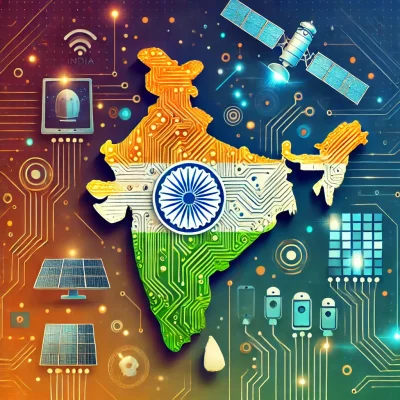Really liked this article: https://www.outlookbusiness.com/mag...tal-empires-india-must-chase-tech-sovereignty
So, here's the gist: the world is witnessing a trend when it comes to geopolitics and tech. Its not so much about armies and tanks anymore; wars are going digital, powered by chips and algorithms. Hello, Hezbollah.
India is sitting on a data goldmine but relying way too much on tech from other countries, especially China. Not ideal, right?
 Remember the 80s? India was making its own computers and electronics. But after the 90s, when we opened up to the global market and signed WTO’s ITA-1 agreement, local brands fizzled out. Meanwhile, China played it smart—built its tech base first, then signed the deal. Fast forward to today, and while India is assembling phones and exporting them, we're only scratching the surface of the tech value chain.
Remember the 80s? India was making its own computers and electronics. But after the 90s, when we opened up to the global market and signed WTO’s ITA-1 agreement, local brands fizzled out. Meanwhile, China played it smart—built its tech base first, then signed the deal. Fast forward to today, and while India is assembling phones and exporting them, we're only scratching the surface of the tech value chain.
Big problem: we don’t design or own the critical stuff like chips or software IPs. Most of our top talent either moves abroad to work on cutting-edge tech or gets absorbed into global giants via GCCs. On top of that, deep-tech startups here struggle for funding and end up flipping to the US.
The government is trying to change the game with a $50 billion push into areas like AI, quantum computing, and EVs. But let’s face it, we need to invest way more in R&D and support startups if we want to dominate global markets and secure our tech sovereignty.
Discussion:
Do you think India’s approach to tech sovereignty—assemble now and innovate later—can ever compete with giants like China or the US? Are we going at the right pace for setting up fabrication units, will we have all the raw material to be self sufficient. What would it take to create a thriving ecosystem for deep-tech and homegrown innovation? Let’s hear your thoughts!
So, here's the gist: the world is witnessing a trend when it comes to geopolitics and tech. Its not so much about armies and tanks anymore; wars are going digital, powered by chips and algorithms. Hello, Hezbollah.
India is sitting on a data goldmine but relying way too much on tech from other countries, especially China. Not ideal, right?
 Remember the 80s? India was making its own computers and electronics. But after the 90s, when we opened up to the global market and signed WTO’s ITA-1 agreement, local brands fizzled out. Meanwhile, China played it smart—built its tech base first, then signed the deal. Fast forward to today, and while India is assembling phones and exporting them, we're only scratching the surface of the tech value chain.
Remember the 80s? India was making its own computers and electronics. But after the 90s, when we opened up to the global market and signed WTO’s ITA-1 agreement, local brands fizzled out. Meanwhile, China played it smart—built its tech base first, then signed the deal. Fast forward to today, and while India is assembling phones and exporting them, we're only scratching the surface of the tech value chain.Big problem: we don’t design or own the critical stuff like chips or software IPs. Most of our top talent either moves abroad to work on cutting-edge tech or gets absorbed into global giants via GCCs. On top of that, deep-tech startups here struggle for funding and end up flipping to the US.
The government is trying to change the game with a $50 billion push into areas like AI, quantum computing, and EVs. But let’s face it, we need to invest way more in R&D and support startups if we want to dominate global markets and secure our tech sovereignty.
Discussion:
Do you think India’s approach to tech sovereignty—assemble now and innovate later—can ever compete with giants like China or the US? Are we going at the right pace for setting up fabrication units, will we have all the raw material to be self sufficient. What would it take to create a thriving ecosystem for deep-tech and homegrown innovation? Let’s hear your thoughts!




